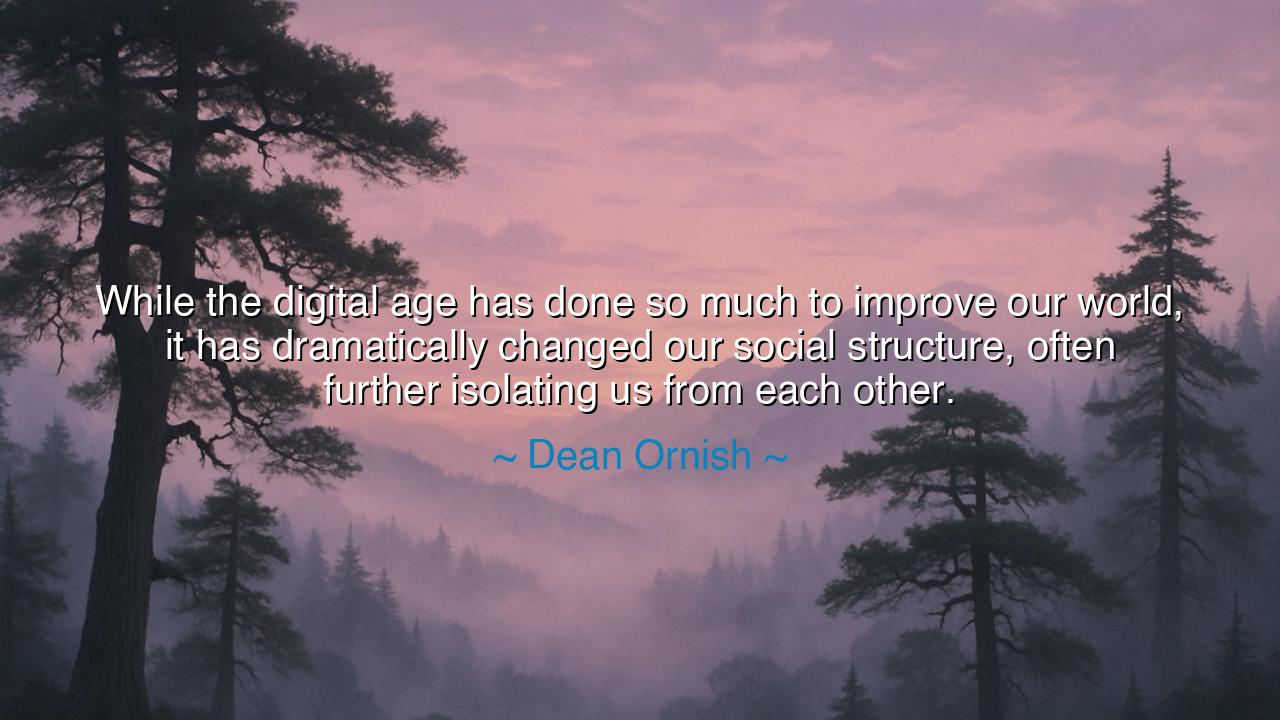
While the digital age has done so much to improve our world, it
While the digital age has done so much to improve our world, it has dramatically changed our social structure, often further isolating us from each other.






In the words of Dean Ornish, “While the digital age has done so much to improve our world, it has dramatically changed our social structure, often further isolating us from each other.” These words are not a condemnation of progress, but a lament for the soul of humanity in the midst of its own brilliance. Ornish, a physician and pioneer of holistic healing, speaks not only as a man of science but as a guardian of the human heart. He reminds us that while the digital age has expanded our reach, it has also narrowed our touch; while it has connected our minds, it has too often disconnected our spirits. The great paradox of our time is that never have we been so linked, and never have we felt so alone.
In the ancient world, the hearth was the center of life. Around its flame, families gathered, stories were told, wisdom passed, and laughter shared. That fire was more than warmth—it was connection, the sacred thread binding hearts together. But in the digital age, our fires have grown cold. The glow that lights our faces now comes not from flame but from screens, and the stories we hear are no longer sung in the warmth of community but scattered across the void of the internet. Ornish calls us to recognize this loss—not to reject technology, but to remember our humanity amidst it. For a world that forgets how to be together soon forgets how to be whole.
Consider the tale of Victor Frankenstein, from Mary Shelley’s timeless novel. In his hunger for knowledge and mastery, he created life through science but failed to nurture it through compassion. The result was tragedy, not triumph. So too has our digital creation—magnificent, powerful, miraculous—become a kind of modern monster when it overshadows the human need for intimacy. We have birthed a world that hums with data but starves for empathy. We speak across oceans in an instant but cannot look into the eyes of those beside us. This, Ornish warns, is the price of forgetting that connection is not only virtual, but vital.
Yet not all is lost. Even in this era of disembodied words and invisible networks, the flame of human closeness can still be rekindled. Look to Mr. Rogers, the gentle teacher of children through television, who used the very tools of the modern age not to divide but to heal. He looked through a camera and spoke as though to one soul, reminding each child that they were special, loved, and never alone. His example shows us that technology itself is not the enemy—it is the intention behind its use that determines whether it builds bridges or walls.
The wisdom of Ornish’s quote lies in balance. The digital world is a marvel—it heals the sick, spreads knowledge, and allows the voiceless to speak. But it is also a mirror that can magnify our loneliness. When we trade the living voice for the text, the embrace for the emoji, the conversation for the click, we surrender something sacred. Humanity was not meant to exist as pixels on a page, but as souls in communion. The great civilizations of the past—Greece, Egypt, China—rose not on the strength of their tools but on the depth of their relationships, their shared purpose, their collective heart.
The lesson, my child, is this: use technology, but do not be used by it. Let your devices serve your growth, not replace your grace. Seek the human face behind the profile, the voice behind the message, the presence behind the post. Walk outside, speak with your neighbor, share a meal without the intrusion of screens. For every hour spent in the digital realm, give one back to the real. The soul, like a plant, cannot thrive without sunlight and touch.
And so, heed the wisdom of Dean Ornish. The digital age has given us wings, but we must not forget our roots. Progress without presence is emptiness disguised as achievement. Let us build a future where technology amplifies love, not replaces it—where connection flows not just through wires, but through hands, hearts, and shared humanity. Only then will we be truly connected—not as users of devices, but as keepers of one another’s light.






AAdministratorAdministrator
Welcome, honored guests. Please leave a comment, we will respond soon